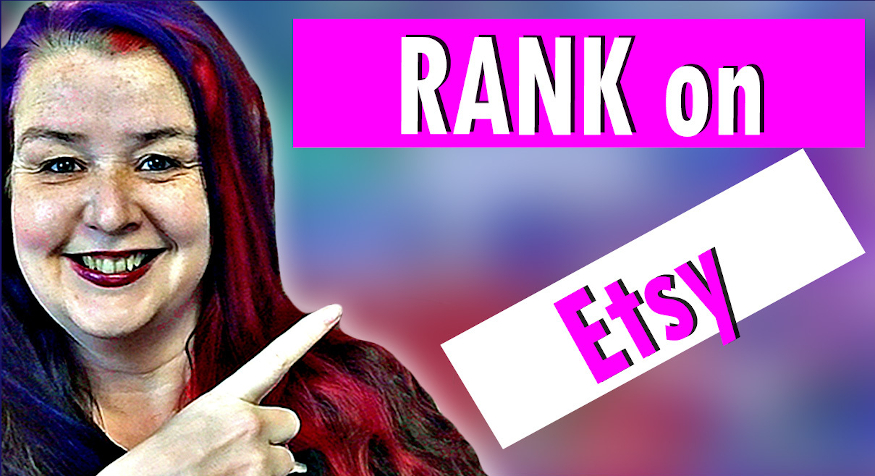Reading time: 7 minutes
If you are confused about how Etsy search ranking works, I can help you with that. I’m Etsy Coach Pam Duthie, here with six of the most important factors that impact how you show up in Etsy search. A couple of weeks ago, I went through the six factors that surprisingly don’t impact your search placement. (I’ll link that post at the end under Resources.) Now let’s get to the things that do!

1: Your Etsy listing title
This is your “prime real estate.” The most important factor Etsy uses to determine whether your product is relevant for a given search term. And by extension, your Etsy search ranking – how near the top you show up in Etsy search. So use your title for those “superstar” keywords. Etsy defines these as:
… “the most descriptive phrases and keywords that best describe your products, or the ones that have been most successful in matching shoppers with your listings in the past. For example, in our shop stats tool or Search Analytics, you can see exact phrases that shoppers have used to find your listings and make sure that those superstar keywords are included in both your titles and your tags.”
from Your Search Questions Answered, Etsy Seller Handbook
Experiment! People will tell you to keyword stuff your title; others will tell you not to keyword stuff. Don’t listen to any of us. See what works for you. And before you make any changes to a current listing, be sure to switch on eRank’s Changes tool. It will record the changes you make to that listing’s titles and tags. Then it reports whether they are improving the performance of its views, favorites, and sales.
2. Your Etsy listing tags
In terms of Etsy search ranking, your listing tags are only slightly less important than your titles. Etsy tells us it looks at our titles and our tags to decide what we’re relevant for and to help us rank in search. On Etsy, “search relevance” is a measure of how accurately a shopper’s search query matches their search results.
Therefore, it is crucial that your keywords match those used by a shopper looking for products like yours. And the easiest and surest way to ensure your tags are relevant? Keyword Explorer. It displays the exact search terms Etsy shoppers enter in Etsy search bar.
3. Your Etsy shop sales
This is another important metric. Let’s look at it from Etsy’s point of view. First, Etsy surveys your products and decides where to rank you. Where to give you a chance with its shoppers. And when it gambles on you like this, it watches to see how your listing does.
So if shoppers buy more of your products than those of your competitors, it won’t matter whose SEO game is better. Because to Etsy, sales are the ultimate proof that customers prefer your product. And your search placement will improve.
4. Your search relevance
Simply getting lots of sales will have a positive impact. But when it comes to how you rank in Etsy search for a given keyword, what matters more is whether you are relevant. Is your product the shopper’s choice for a particular keyword? And therefore more relevant for that keyword? Here, we’re talking performance. Etsy wants to see how your product does for specific keywords.
Example: let’s say your product is a sunflower dress. And let’s say that Etsy’s algorithm shows your item in searches for both “summer hat” and “sunflower dress.”If the “summer hat” search doesn’t generate a sale of your dress, that won’t impact your listing’s search ranking. Why not? Because Etsy’s own artificial intelligence (AI) chose to show you in the wrong place, and it’s still learning.
Next, Etsy’s search algorithm will put that machine learning to work. It will say to itself, “Hmmm. Okay then, this item must not be relevant for summer hat.” Then it checks to see whether the “sunflower dress” search worked. Did it result in a click, a visit, a favorite, a sale? If it did, this should improve your Etsy search ranking. Because you’ve proved that your product is more relevant for that search, and has earned a better search placement.
5. Your customer experience
So yay, you’re making sales! But Etsy is also judging how well your customers are treated post-sale. And Etsy literally keeps score! (In case you want to learn more, I’ll include some links at the end under Resources.) As well as listing scores, you also have an overall shop score. It’s called your “Customer and Market Experience Score.”
“In addition to helping people find items they want to purchase, we want buyers to have a great experience when they shop on Etsy. To do this, we give each shop a customer and market experience score and factor it into search placement [emphasis added]. Getting great reviews, having complete shop policies, and adding an About section positively impact your search ranking, while recent cases opened against your shop and intellectual property infringement issues can hurt your search ranking.”
excerpt from How Etsy Search Works, Seller Handbook
Now, Etsy does not count it against you if, for instance, you need to extend your production time. Or have to cancel an order. Rather, factors it will tally include cases lodged against you. And of course, violations of Etsy’s prohibited items policy. And (sigh) customer reviews.
Next let’s talk about how Etsy factors these into your search placement (because it does). Don’t panic though. Etsy knows that most customers just don’t leave reviews. And that others never leave a five-star review. Etsy takes this into account. You won’t be penalized for a four-star review, nor for the occasional low review.
What does matter? The ratio of how many five-star reviews you get in proportion to the number of sales. Etsy looks at this metric to evaluate whether it can trust you. If it shows your product in search and people buy it, will they have a positive experience? Because if those customers are happy, they’ll come back to shop on Etsy again. Repeat buyers are the best buyers. Etsy prizes loyal customers because they generate more money for Etsy. Ergo, Etsy wants to show customers the shops that are going to treat them well and keep them coming back.
6. Your Etsy shop policies
Having your shop policies filled out is important. Etsy explicitly tells us that this is a ranking factor. Look, it’s something you only have to do once. Then at most you just fine-tune them with a bit of a tweak now and then. So if you haven’t filled out your policies, go do it right now. Obviously it helps your customers, but it also protects you! Should a cranky customer complain about something covered in your policies, that can help you. And simply the act of filling them out helps you show up in Etsy search.

Pam Duthie, Etsy Coach
RESOURCES
This article has a companion, with 6 factors that don’t affect your search placement (some of which might surprise you!) And both articles are based on videos on my YouTube channel. Here’s the video for this one; and its companion
The first passage I quoted was excerpted from this article, “Your Search Questions Answered,” in Etsy’s Seller Handbook.
And here’s the article from which I sourced the quote about scores, which is from “How Etsy Search Works” in the Etsy Seller Handbook. At the end of that excerpt I quoted, it suggests for further reading, “How Great Customer Service Can Improve Your Search Ranking,” which in turn is prefaced: “Great reviews and an About section may improve your shop’s search ranking while intellectual property issues and cases can hurt it.” Good to know, right?
Etsy Coach Starla Moore tackled a different set of Etsy search ranking factors. In it, she covered in more detail the topic of listing quality and shop scores. Here’s her blog post for eRank.
Tools I’ve mentioned:
- eRank’s Changes tool to track whether your listing edits help or harm your Etsy search ranking
- eRank’s Keyword Explorer to discover what search terms Etsy shoppers are using

